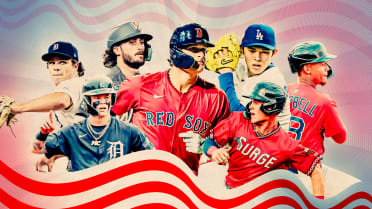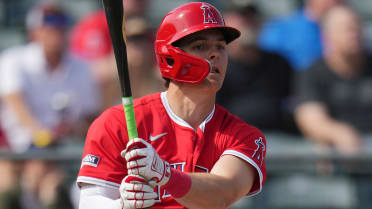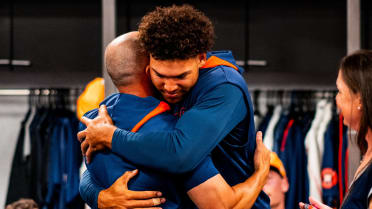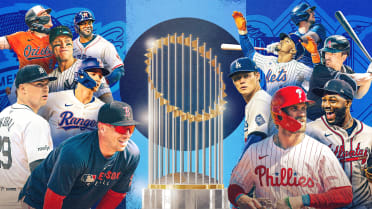You hear it every few minutes on the radio while driving around the streets of Fairbanks. Like the sun, it’s hard to escape in this part of Alaska.
This weekend -- it’s the Midnight Sun Festival! The Goldpanners will kick things off on Friday playing in the annual Midnight Sun Game. Tickets are selling out, so get yours while you still can!
Flyers are taped on storefronts, anybody you talk to knows the history of the game.
The small city – just south of the Arctic Circle, that spends 8 months living in the dark – is more than ready for the 24 hours of light. They bask outside in it. They bike the trails and they ride the rivers. They pan for gold. They roast their reindeer hot dogs.
And for 119 years, the baseball-loving town has played baseball in it. A game that runs through midnight on the summer solstice with zero artificial lighting. A dreamlike, time-warping, one-of-a-kind event.
“It’s really a tremendous experience,” Alaska Goldpanners GM John Lohrke told me. “I have coaches come here who’ve been coaching for 40 years saying, ‘John, I’ve never had a fun evening like that.’”
“There’s not anything like it,” Bob Eley, former longtime sports editor for the Fairbanks Daily Miner, said. “If you’re a baseball fan, you have to do this once in your life.”
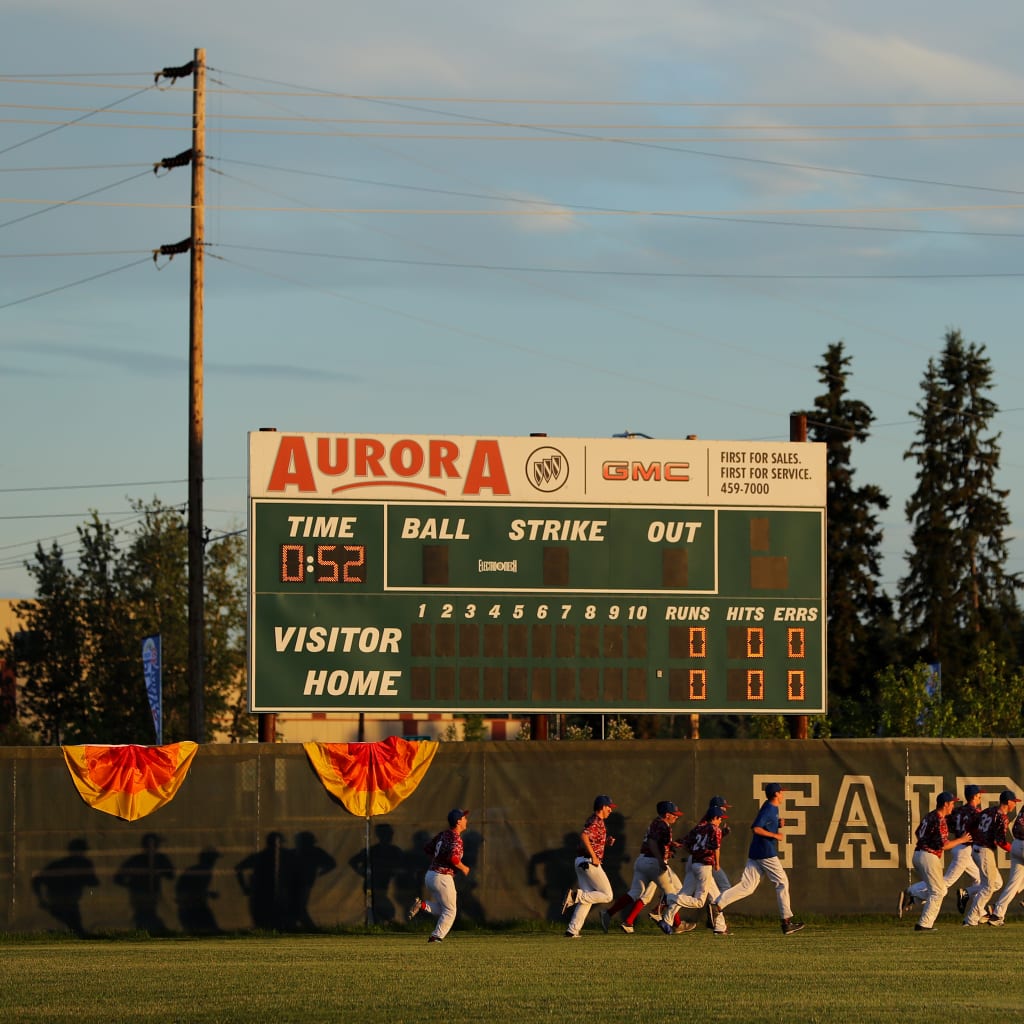
The History
Baseball, if you can believe it, has a long, storied history in Alaska. Even way up near the end of the world.
The sport's origins go back to around the time the United States purchased the territory from Russia in the late 1800s. Whalers and prospectors from the contiguous U.S., Asia and other parts of the world -- holed up in the area for months -- passed the time playing hardball on fields of ice and heavy snow. St. Paul Island may have had a team as early as 1868. Snowshoe baseball was a fairly common activity.
And back on June 21, 1906, the area's most famous baseball event, and one of the more unusual on Earth, began its inaugural foray into sports history. Two local bar teams in the gold-rich town of Fairbanks agreed to play each other in a game that would run through midnight because, well, they could: For 70 days, from about mid-May through mid-July, this part of Alaska sees about 24 hours of daylight -- with the summer solstice on June 21 remaining the longest under the sun's beams. So much so that no stadium light is needed to catch a pop-up or hit a curveball.
"Tell this to your friends when you go outside," the Fairbanks Daily Times' stated postgame in 1906. "Say to them that on June 21, while you were in Fairbanks you attended a game of baseball that started at 11 o'clock at night and ended at 12:30 the next morning."
The high noon at midnight classic has been happening ever since. And from 1960 on, the Alaska Goldpanners -- a collegiate summer team based in Fairbanks -- have been the hosts at Growden Memorial Park. They typically play local amateur teams or other summer college squads from around the country.
The Players
The 'Panners, as lovingly abbreviated by Fairbanksans, have popped in and out of the Alaskan Baseball League over the years -- a summer circuit that, since its inception, has hosted some of the best college players and future pros in America. It's toned down recently, but during certain time periods, it rivaled the Cape Cod League for collegiate summer league prominence.
Mark McGwire and Randy Johnson played for the Glacier Pilots. Jeff Kent and Paul Goldschmidt appeared for the Anchorage Bucs. Aaron Judge scouted moose by day and pitchers by night during the endless Alaskan summer.
"This was it," Eley told me. "This and the Cape."
The 'Panners have a storied past all on their own. They've won the most league championships and you wouldn't believe some of the names that have put on the orange and yellow uniform over the last six decades.
Tom Seaver spent two seasons in Fairbanks in 1964-'65 -- putting up a miniscule 1.57 ERA and combining on a no-hitter during a game in his first year. He even pitched in the actual Midnight Sun Game, although the results were less than desired.
"Seaver started the Midnight Sun Game and didn't make it through the fifth inning," Eley laughed. "A kid from Anchorage came in and relieved him and got the win."
Jason Giambi was a top hitter at Growden Park in 1990.
"I remember writing an article about Jason Giambi," Eley said. "He went 3-for-3 with 3 RBIs and he was wearing No. 3. It was the perfect story."
All of the Boones played, Dave Kingman hit some monstrous sun-shots and Barry Bonds was there in 1983 ... sort of.
"Bonds was never in Fairbanks," Lohrke said. "He joined us in Anchorage at the end of the summer and we got rained out twice. We went to a tournament in Wichita and he played for us for like six games."
Was he good?
"Oh yeah, yes."
But of all these college kids traveling to this faraway place, just south of nowhere, at the outset of their MLB careers, there's one who embraced the small-town warmth of Fairbanks the most. A man who was in attendance at the 2024 edition of the Midnight Game to get his very own statue.
"What I learned about Fairbanks and Alaska, there was such a sense of family," Dave Winfield said at a pregame press conference. "There's a sense of community. For a town that small to be able to accommodate a team, bring kids up here from all over the country, help shape their destiny, give them a push or a pat on the back to go to the next level -- that's what it did for me here."
The Hall of Famer played for the Panners during the '71 and '72 seasons -- winning an MVP and a championship his second year. He put up gaudy numbers as a two-way player: 18 homers and 72 RBIs; 13-4 with a 3.71 ERA. He hit a still-very-much-talked-about 500-foot homer off a curling club in left field. He worked in the town at a furniture store when he wasn't playing ball, he fished for enormous pike in the region's frigid rivers, he was incredibly impacted by his time in Fairbanks and they were impacted by him.
The Game
Roaming around the ballpark on the 21st, you can sense that the pride and love for this strange little ballgame is everywhere.
"It's very cool, I just had to take a picture at midnight to show my friends how bright it was," Cindy Strauss, from St. Louis, Missouri, told me. "It's just, it's a lot of fun."
"It's really an amazing atmosphere," Mathew Zaninovich, out of Bakersfield, Calif., said. "The game itself is a lot of fun, but it's just such a festive event that really brings the community together. So much positive energy here tonight."
"We'll have people come from Australia, New Zealand and Great Britain and they don't even know what the hell a baseball game even is," Eley told me. "But they show up because they happen to be here on the day."
"People come from all over," Lohrke said. "We had 35 different states in the lower 48 represented here last year and three or four different countries. It's a bucket-list game."
Besides the quirk of, you know, starting a game at 10 p.m. and playing it through midnight, the Fairbanks game also has some other unique elements.
A live folk band plays in the bleachers.
Once the clock hits midnight, a group of women known as the Sweet Adelines venture out to the mound to sing the Alaska Flag Song.
Kazoos are handed out to fans and a very bizarre tune called "Happy Boy" is sung during the seventh-inning stretch.
"It's a sick song," Lohrke told me, laughing. "You know, it's like, 'Where's Take Me Out to the Ball Game?' No, we're not gonna do that."
As the evening wears on, or at least I think it's wearing on, the 'Panners continue piling on in what will eventually be a 10-4 win. Winfield, who had been at the field since his statue ceremony seven hours before, is still at the park. He seems to be having trouble leaving a place, a game that played such an important part in his life. He makes his way up to the press box, curious if someone can tell him his stats during his time with the Goldpanners.
And it's not just Winfield.
The entire crowd is still here. Nobody can seem to pull themselves away. The clock says it's almost 1 a.m., but the sun and the sky tell otherwise. It's time for some Sweet Caroline.
The Midnight Sun memorabilia line, which has been long all game, has finally tapered off. They likely ran out of merch. The concessionaires begin closing up shop. The sun has somewhat set behind some distant hills, creating a soft twilight glow.
It wouldn't be long, though, until it was back up again.
"This has always just been a bucket-list item for me," Zaninovich said. "Something that I heard about as a kid and I always thought, 'Man, this would be so cool.' So, to finally be here for the first time, it's just a good feeling."
That feeling is something that everyone -- whether you're at the sun festival, a restaurant or neighborhood bar -- talks about. It's what Winfield felt 50 years ago and what brought him back 50 years later. It's what kept so many great players coming for so many seasons and what attracts so many visitors from around the globe.
It's a high, a burst of good ethos, something so ethereal it's, well, kind of hard to explain.
You'll just have to come experience it yourself.
Matt Monagan is a writer for MLB.com.

